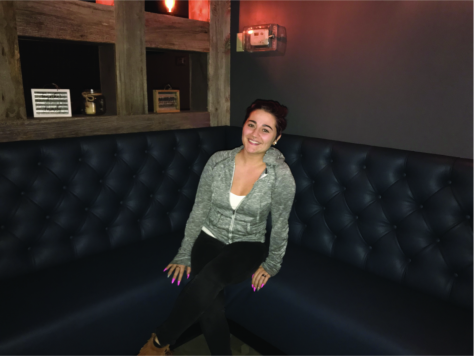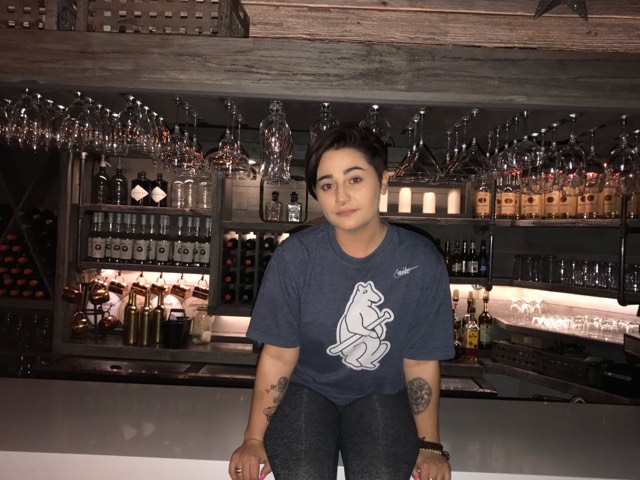NEIU Artist Spotlight: Katharina Losacco
December 4, 2019
Northeastern Illinois University alumna Katharina Losacco is an aspiring poet unafraid of projecting the frustrations of emotional trauma onto her audience. Losacco, who graduated with a bachelor’s in English, currently works as a bartender at The Nest Bar & Eatery, a quaint yet bustling bar in the Dunning neighborhood of Chicago. In 2017, Losacco drafted “Disoriented Innocence,” a poem that narrates the struggle between confrontation and avoidance.
Disoriented Innocence
I have forced your image out of my head
I have blocked out minutes and days and months just to say we have never met
I refuse to engage in your memory
Sometimes I combine you with countless men who have entered my body
I hate you
You have taken my body and made a dollar store art project
You have taken your hands and smeared hate and shame all over my torso
You have hit me and beat me with your words from other mouths that turn into perfect frowns as they tell me I am overreacting
I can count on my fingers how many times I have been called a liar–
Once
Your black silhouette still haunts me as I lie in bed staring out my window
Leftover guilt gathers and makes way,
as if my mind was a watering hole for self disgust
I look at you as irrelevant chapters in an old book that don’t quite fit,
In the novel that I read and keep next to my bed at night
You are a portrait of me at my worst
And a photograph that was burned in a fire that occupied my crown
The fire burned out long before I wrote this…
But the smoke still lingers, clogging my view.
Losacco harnesses the ability to concurrently illustrate a pointed narrative while leaving her work just abstract enough for her audience to inject their own interpretations. Her words are powerful, vivid and unapologetic, forcing her readers to both reminisce on fonder memories while reenacting moments of emotional trauma. .
On first read, it appears that Losacco has relegated the memory of a figure from her past to the aging pages of an outdated novel. Those memories, so inconsistent with her current trajectory yet still enticing enough to reread, read like a harrowing simplification of sociology’s Social Mirror Theory, which states that we subconsciously adopt others’ perception of us into our own self-image.
“You are a portrait of me at my worst.”
“Disoriented Innocence” also stimulates consideration as to why we feel obligated to mentally and emotionally block our ex-partners from our lives. Are we traumatized by the actions of our significant others or simply handicapped by the memory of a time when we were happy? Our generation latches onto nostalgia, eagerly receiving anything that reminds us of a less complicated time in our lives. Sure, we may no longer possess feelings for the actors of our past selves, but that doesn’t stop us from allowing their lingering memory to serve as a vivid reminder of our failed expeditions into friendship and romance.

Katharina Losacco shares her story of perseverance.| Photo by Matthew Rago
Finally, “Distorted Innocence” exposes the double standards of an abusive relationship. “You have hit me and beat me with your words from other mouths that turn into perfect frowns as they tell me I am overreacting,” writes Losacco, exploring the suffocation of not feeling heard. The only thing more disheartening than the actual experience of emotional trauma is being spurned when you try to communicate your pain. Abusers haze. Abusers bully. Abusers tear their targets down just to reconstruct their victims in an image more fitting for their fragile egos. But when the abused speak up or, god forbid, speak to their abusers in the same manner that their abusers speak to them, communication devolves into conflict. Perhaps the abuser will adopt a victim’s complex in an attempt to diminish a valid contention. Or worse, the abuser will become more malicious, aiming for the most vulnerable spot on an already compromised self-esteem.
We become isolated, too afraid of rejection to reach out to others yet too unsatisfied to continue along the same path. Losacco’s description is raw, suggesting a personal connection to the carefully crafted words.
However, Losacco offers a much more harrowing backstory. “Disoriented Innocence” explores the trauma and subsequent emotional recovery from sexual molestation.
Preferring to create in both a vulnerable and inebriated state, Losacco documents the frustrations she felt unable to express to her support network. “If I’m completely sober–like if I’m not drinking or anything–I guess it’s hard to admit my feelings and admit things that I was going through,” said Losacco. “But the older I’ve gotten, I think it’s easier to pick apart my brain and figure out how I’m feeling, why I’m feeling those things and how they connect to the things that happened in my past.”
But Losacco says that discovering poetry as an outlet to confront feelings of shame or displaced guilt has been therapeutic. Embracing her demons has afforded her an understanding that her conflicting emotions are normal. Losacco understands that she’s not on an island, that what occurred in her past is not exclusive to her.
“I was molested when I was really little,” said Losacco. “I was scared, angry and did not know how to let that out. But since I’ve been writing, I think it’s easier to show that through my writing.”
Losacco says family infighting and jealously guarded secrets stunted her healing process and created divisions that are only just beginning to mend. Over the past year, Losacco has discovered a newfound appreciation for intimacy, something she struggled with prior. “I can be intimate with people now. For a while, it was really hard.,.I felt like I was back when I was 7 years old.”
Losacco champions the importance of moving on and finding healthy, constructive ways to lessen the burdens of trauma. She regrets masking her feelings with alcohol, stating that while intoxication is a temporary reprieve, alcohol doesn’t eradicate the underlying stressors of emotional pain.
Losacco concluded the interview by emphasizing how valuable solidarity and community are when dealing with emotional blockages. She highlights the importance of ventilation and the consequences of nurturing a parasitic relationship with our traumas for the sake of secrecy.
“You have to have something to let your anger out,” said Losacco. “If you don’t, it just manifests (itself) and gets worse. Definitely go talk to somebody. Because I feel like if you don’t, you can’t get through it on your own.
“You’re not alone. You’re not the only person that has been through it. It doesn’t make you a bad person and it’s never your fault when something like that happens to you. It took me a long time to figure that out.”








